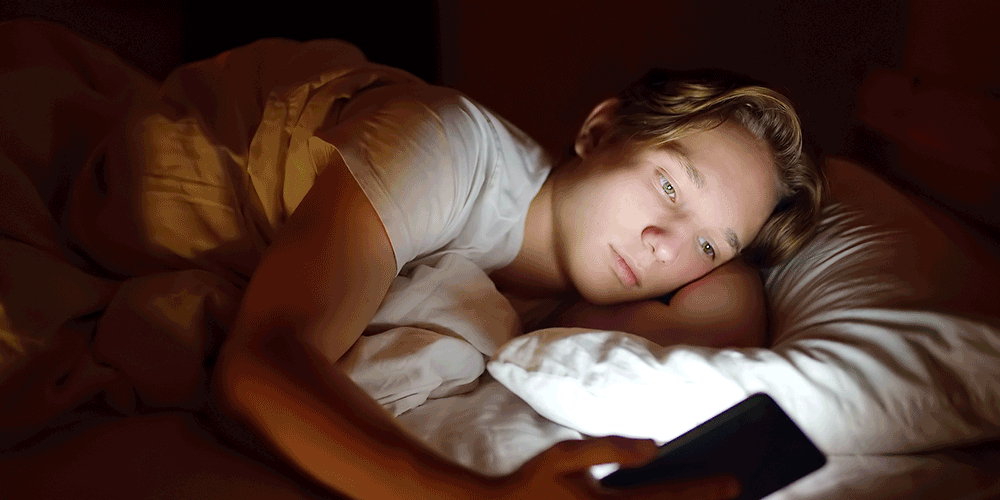Tips for tackling teen sleep issues

Tips for tackling teen sleep issues
Sleep is important for everyone, especially growing children and teens. Children who get enough sleep tend to have healthier immune systems and better memory, school performance and mental health. Sleep deprivation can lead to difficulty concentrating, crankiness, mood disorders, weight problems and behavioural problems. How much sleep are young adolescents getting and how many are having trouble sleeping?
Teens often have more trouble falling asleep than when they were younger. This is due to rapid body changes that can disrupt sleep. This happens when the growth phase they are in can cause their circadian rhythm (the body’s internal clock) to reset, delaying their sleep cycle.
Other causes of sleep deprivation patterns include late night phone and social media use – and watching TV around bedtime due to having a TV in the bedroom, keeping many teens awake. Lack of certain minerals can also impact on sleep, especially iron deficiency that may lead to night-time cramps.


Here are our top tops to help your teen get enough sleep:
Encourage daily exercise and time outside…
Physical activity can help your teen to sleep better. However, try to avoid sports practise or other types of exercise too late in the day so that there is time to unwind. Spending time outdoors each day is also a good idea as it can help support a healthy sleep-wake cycle. Be sure to shower after to keep on top of your sleep hygiene.
Avoid over-scheduling to help sleep patterns…
Having too much going on can make it difficult for your teen to get enough sleep. If they are running from one after-school activity to another, they won’t be able to finish their homework at night. We all need time to relax at the end of the day to help us get better sleep, so keep on top of your relaxing bedtime routine.
Limit screen time before bedtime…
Light exposure, such as blue light from phones, computers, tablets. TVs and even nightlights can trick the brain into thinking it’s daytime. Over time, this is likely to disrupt your teen’s natural levels of melatonin (the ‘sleep’ hormone).
Encourage your teen to put all screens away at least one hour before bedtime and charge up their devices outside their bedroom overnight. Having screens right there is tempting and sets teens up for staying up all night with insufficient sleep.
Limit late meals and caffeine to fight sleep problems…
Aim to eat supper a few hours before bedtime and offer foods that are easier to digest. Caffeine (not only found in tea and coffee but also in many popular soft drinks and energy drinks) can stay in the body for more than 8 hours so ideally your teen should avoid caffeine after lunch. Especially during the school week, as this can effect academic performance when a teenager's life has an unreliable body clock.
Optimise the sleep environment and fall asleep…
This is very important and can help to make a big difference to the quality of sleep. Make sure your teen’s bedroom is cool (not cold) but comfortable. Our bodies naturally have to drop to a certain temperature before we can go to sleep and an overly warm bedroom will impact on that process.
If light bothers your teen then put up well lined curtains or black-out blinds (the latter being especially helpful in the summer when it gets light earlier to encouraging a quality sleep).
Create an inviting sleeping space with a comfy mattress, duvet and pillows and use natural bedding wherever possible. Wool bedding, for example, is a great choice because it is naturally breathable and temperature regulating – and is also resistant to dust mites and the build-up of micro bacterial, which makes it hypoallergenic and hygienic.


Research has proven that wool bedding can help achieve a better night’s sleep through its natural properties. Encourage your teen to reserve their bed for cosy nights of sleep rather than being the place for doing homework or other daily activities there. This will help your teen’s brain to connect lying down in bed to help them to fall asleep.
If you’d like to talk to us about how our individually handcrafted 100% British wool bedding range can help make your teen’s bedroom a cosy sleep space, then please do get in touch with the team by email or call 01752 345399. They will be happy to talk through the options available.
Always ask your doctor’s advice if your teen’s sleep problem continues, as there may be other issues behind this.


